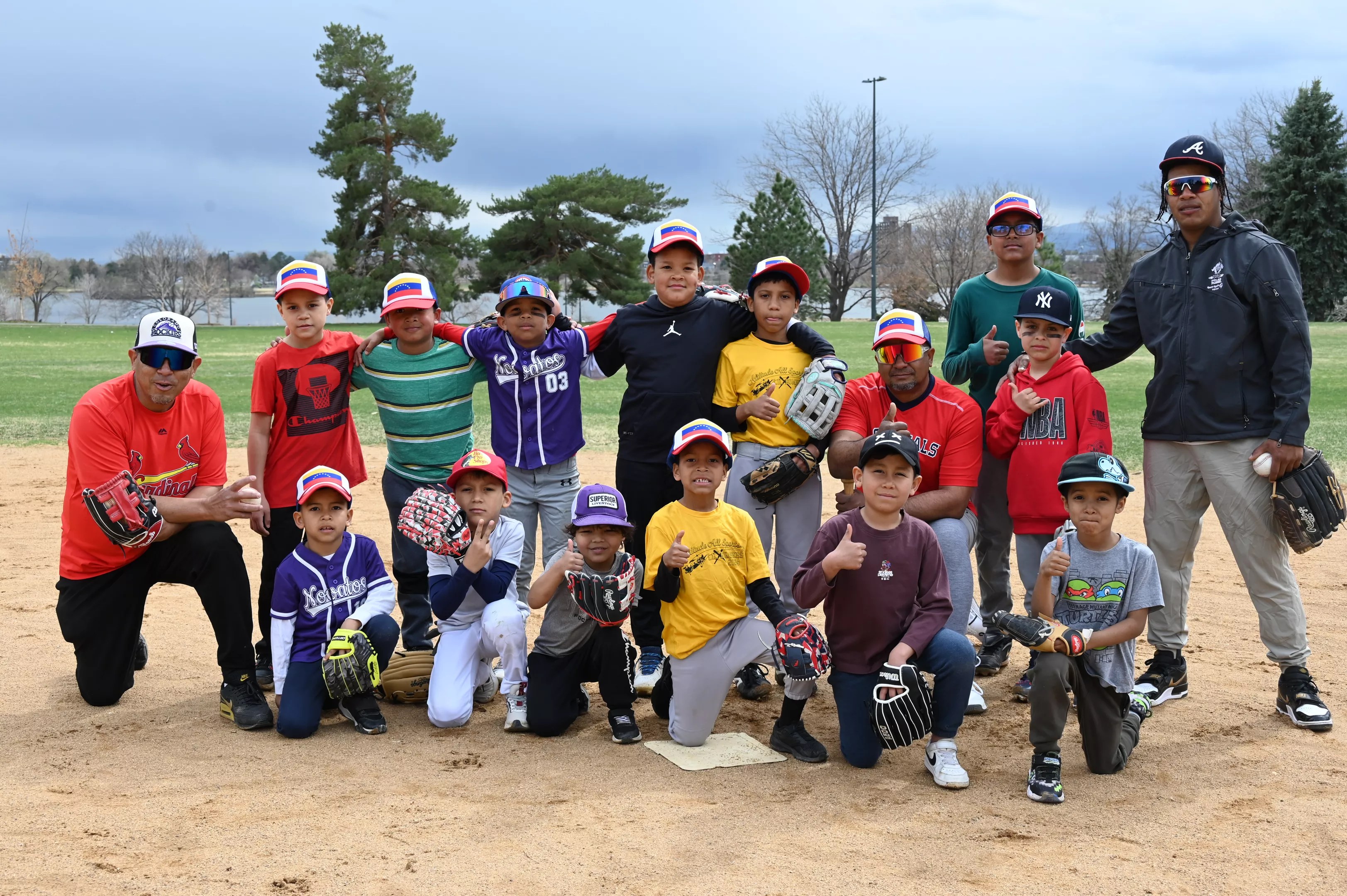
Bennito L. Kelty

Audio By Carbonatix
Despite a rain cloud closing in from behind Sloan’s Lake, Edgar Ramos and his coaches handle Saturday’s training of Team Venezuela like they have all the time in the world. Kneeling down to instruct kids eye-to-eye and taking easy swings with fungos to send practice ground balls toward the infielders, they punctuate every instruction with “¡Duro!” or “¡Vamos!”
“¡Rapido, rapido, vamos! Fast, fast, let’s go!” Ramos yells as they scoop up ground balls and throw them to where he stands at first base.
“¡Cogela, cogela, duro! Pick it up, pick it up, hard!” he shouts to the next infielder in line to field ground balls hit by fellow coach Yianco Ramon Garcia.
Behind Garcia, Ramos’s other coach, Julian Alexander Lara, is replacing a ball on a tee for five-year-old Maylob Quevedo. After he sets the ball, Lara points to the center of the baseball and instructs the boy to hit it “¡Allí pero duro! There but hard!“
Quevedo takes a swing but shows some hesitation in his follow-through, so Lara tells him, “¡No lo pares, duro! Don’t stop it, hard!“
Another swing, and Quevedo hits it on the mark but not hard enough. “¡Así pero duro!” Lara says.
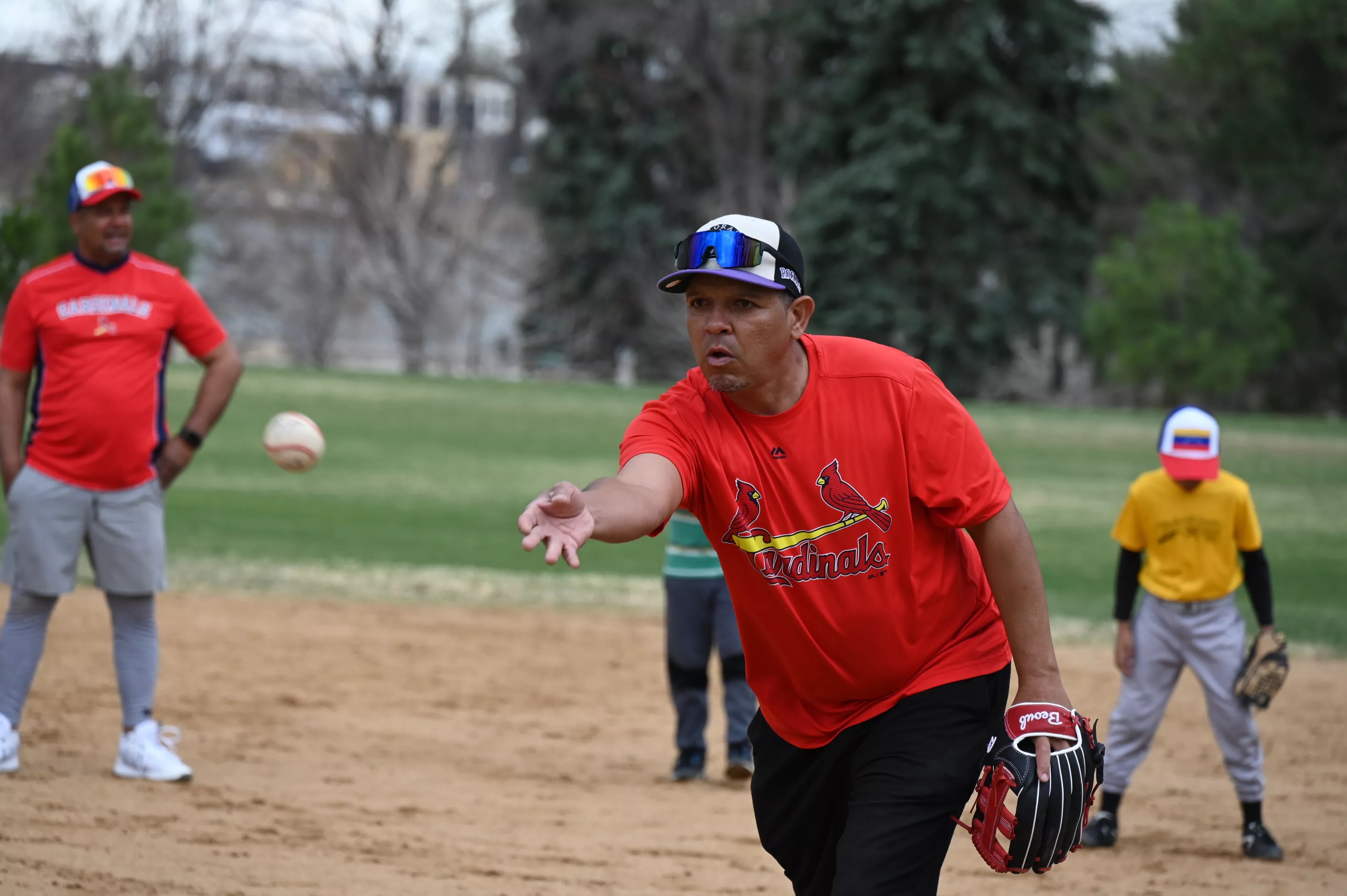
Edgar Ramos underhand tosses balls during practice.
Bennito L. Kelty
Meanwhile, Ramos is hollering instructions to throw to first base. “¡A primera, a primera!” he says. Garcia starts hitting grounders toward the kids at third base so that they can practice their throws to second, and Ramos switches his instructions: “¡A segunda, a segunda, vamos!”
The drill changes so that the youngest kids in the group start hitting underhanded pitches from Ramos toward the older kids practicing in the infield. When seven-year-old Joaquin Pereda’s aluminum bat rings with hard contact, mothers in the crowd yell “¡Eso!”, offering an encouraging There you go! or That’s how you do it!
“¡Ni es mi hijo! That’s not even my kid,” Génesis Lemus gleefully admits to other mothers laughing around her.
Ramos’s team comprises about thirty kids between the ages of four and twelve who immigrated just a year or two ago from Venezuela; a few more came from Cuba and Peru. They keep practicing three times a week for games that they hope will come. Because despite Team Venezuela winning the Lil Bombers League championship with the Altitude All Sports program in November, Ramos couldn’t find a league for his team this spring, so it has no games scheduled.
Even though Ramos is hopeful he’ll find a league, right now, the kids are just practicing for the love of the game.
“Baseball is the number one sport in Venezuela,” Ramos says. “When you’re born, they gift you a baseball glove or a bat.”
In Venezuela, baseball is big. It’s considered the country’s national sport, and there’s been a national league similar to Major League Baseball since 1945 that’s even attracted professional U.S. baseball players. Meanwhile, more than 400 Venezuelans have played with MLB teams – no surprise to American baseball fans who know about legends like Miguel Cabrera, Luis Aparicio and Colorado Rockies legend Andrés Galarraga.
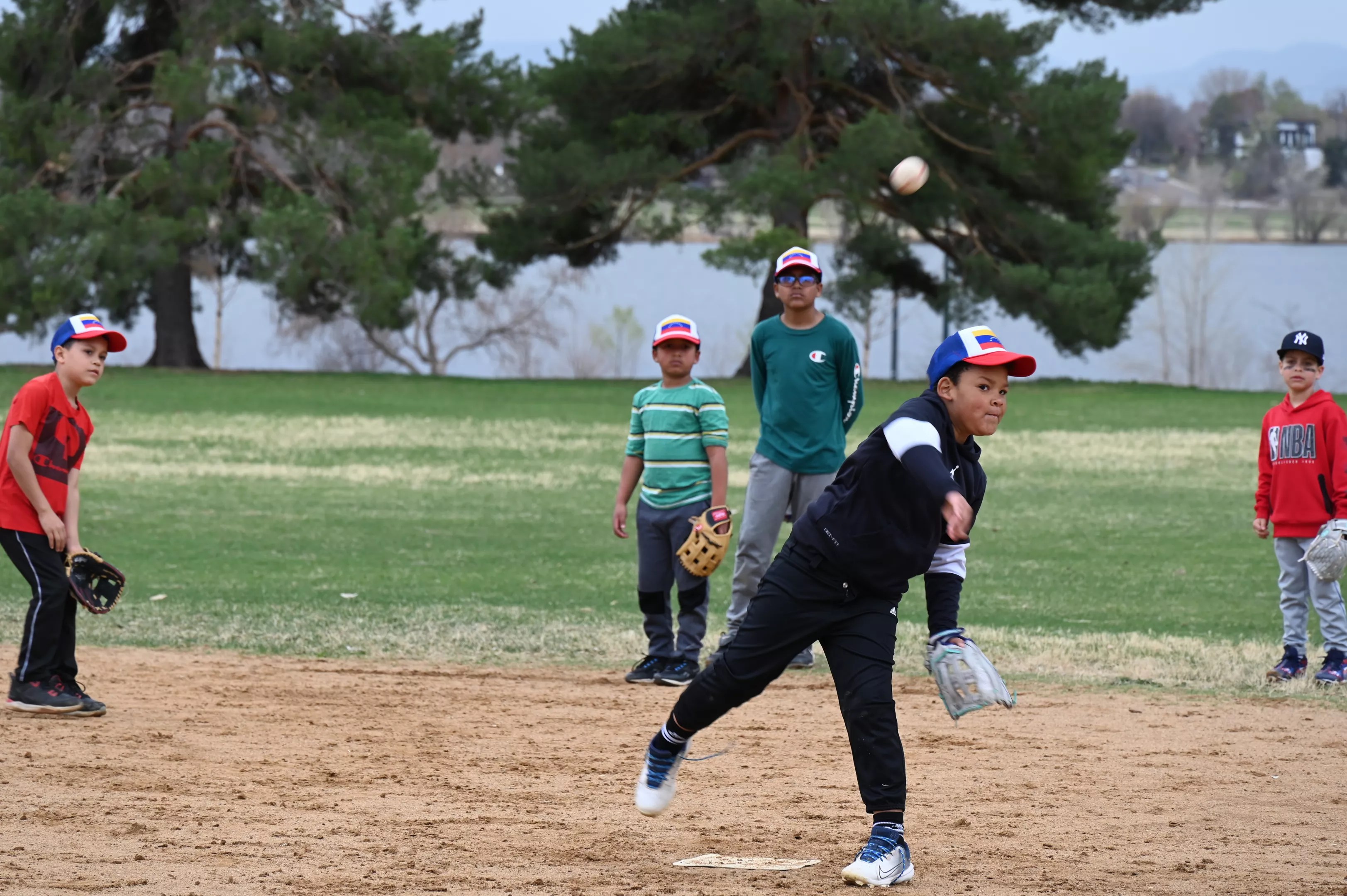
Derek Perez Leal throws a ground ball during practice with Team Venezuela.
Bennito L. Kelty
Dozens of Venezuelans are currently playing in the MLB, including Rockies all-star shortstop Ezequiel Tovar, who visited Team Venezuela last November. Ramos knows Tovar’s cousin and invited him to visit; he brought gloves, bats, hats and shirts that Ramos had been hoping to use for his team uniform, but their Little League season was about to end.
“It’s a sport that I practiced all the time when I was a kid, too,” recalls Hernan Pereda, the father of Joaquin. “The sport that pretty much every Venezuelan plays as a kid is baseball.”
Nine-year-old Melvin Soto Montilla joined Ramos’s team at the end of March. He arrived in Denver a year and half ago from Valencia, a large lakeside city in the Venezuelan state of Carabobo that’s separated from the Caribbean Sea by mountains. He remembers playing baseball there while he was in school. In the United States, he’s noticed that baseballs are easier to come by than they were at home, where they often had to make baseballs out of mud.
“In Venezuela, they didn’t have that many baseballs,” Soto Montilla remembers. “We would grab pebbles of mud and roll them up with glue so that we could use them as balls when we put them in the sun.”
His nine-year-old teammate, Ricardo Velázquez, who came from the coastal city of Barcelona in the Venezuelan state of Anzoátegui, has similar memories of mud baseballs. They were made from a natural glue in the trees, not the type they used in school.
“There are trees that have a glue,” Velázquez explains. “Venezuelans would take a little, put it in the ground, mix it and grab a tiny, tiny bit to make a little ball.”
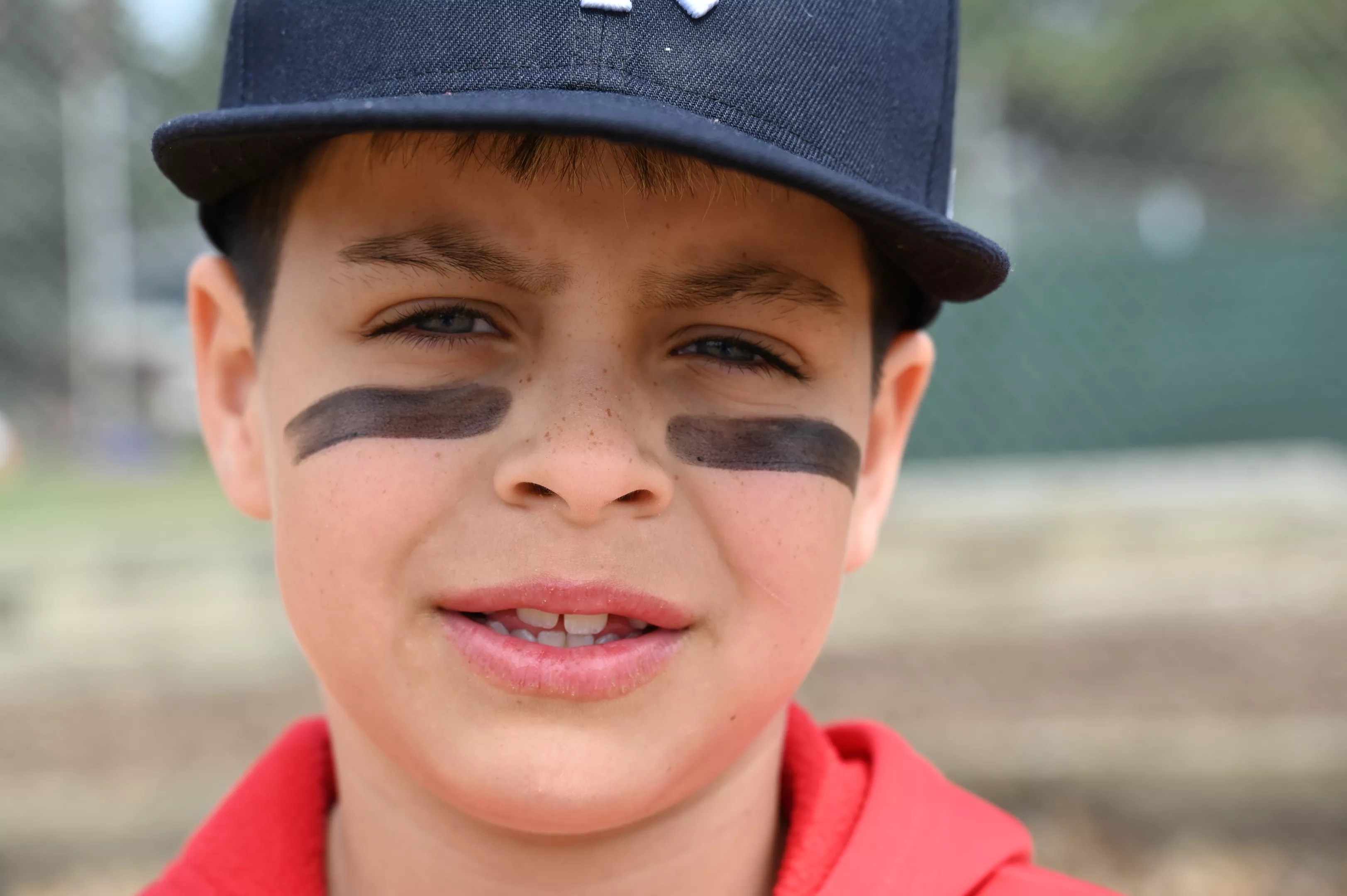
Eight-year-old Maikol González immigrated from Cuba but plays on Team Venezuela because “I like baseball a lot.”
Bennito L. Kelty
“The bat was a boom handle,” recalls Maikelys Lopez, the mother of one of the players. For a ball, Lemus adds, they would sometimes use a “chapa,” or the cap of a glass bottle.
Kids in Venezuela spent most of their free time out in the streets playing, at times “without shoes, without a jersey, until sunset,” Ramos remembers.
“In Venezuela, they’re always going out and playing in the street,” he says. “You don’t stay in the apartment. Your mom and dad are in the house, and you’re out in the street, playing.”
The baseball games that kids played in the Venezuelan streets didn’t last nine innings; they lasted until “your mom yelled from the window ‘come eat!,’ or until someone broke a window. Then everybody would start running away and the game is over,” Ramos adds.
A Game Without Borders
Venezuelans started leaving their country after the death of President Hugo Chavez in 2013, as the economy tanked under Chavez’s successor, President Nicolas Maduro, who is still in power. Maduro also scared away citizens by imprisoning innocent civilians and retaliating against activists who protested his dictatorship.
Many of those Venezuelans wound up in Denver. In the 28 months since Denver declared an emergency in December 2022 in response to the influx, about 43,000 migrants have arrived in the city, mostly from Venezuela and mostly after being bussed from the southern border of Texas.
The Venezuelans brought their love of baseball with them, Ramos says.
Ramos is from the small town of Tucupido in the interior state of Guárico in the Venezuelan lowland, but he worked as a merchant marine. He fled his homeland with his family in late 2018, shortly after Maduro was re-elected, and landed in Peru. Seeking a better opportunity for his children, he joined the exodus of Venezuelans trekking towards the United States, walking from Peru through Ecuador and the jungle between Panama and Colombia known as the Darien Gap, then through Central America and Mexico.
The whole journey was “bien duro,” but the Darien Gap and Mexico were the toughest. “The jungle, it was just trees everywhere, and well, that’s when people started to die,” Ramos says.
“I was bringing a one-year-old kid with me,” he recalls. “Mexico was intense. We had to grab the train. We traveled by train six days and six nights. While we were in Mexico City, someone threatened my wife and kids. It was real tough.”
Ramos arrived in Denver with his wife and two daughters in December 2023. By then, Denver had already been dealing with the migrant crisis for a year, and the number of Venezuelan migrants arriving in the city was reaching new highs every week.
He and his family lived for four months at a motel near East Sixth Avenue and Federal Boulevard that the city had converted into a shelter for migrants. Ramos recalls the other families staying there, and the sad faces of their kids. “It wasn’t an adequate environment for them,” he says.
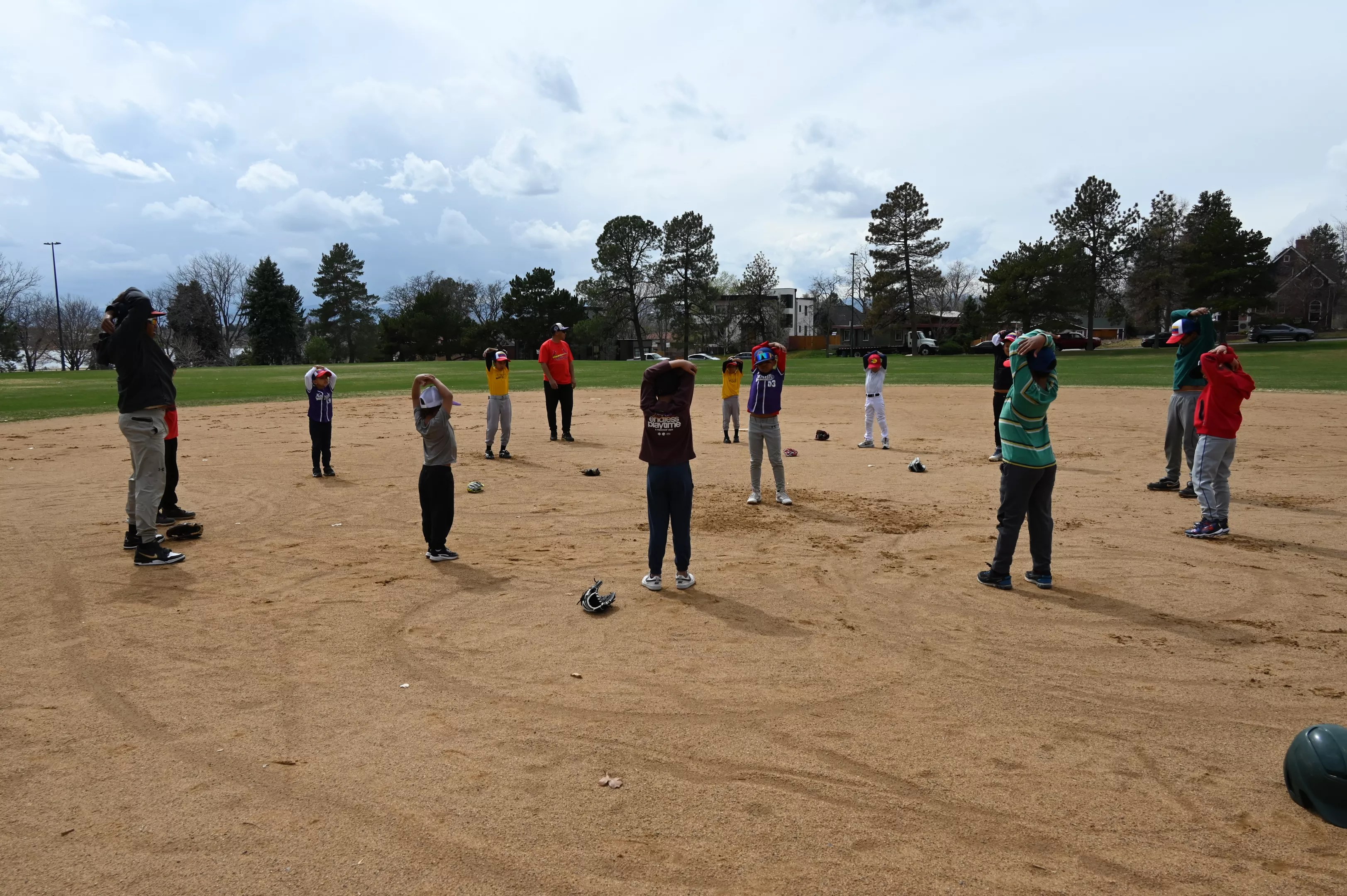
Team Venezuela stretches on the baseball diamond in Sloan’s Lake.
Bennito L. Kelty
But the location was right across Sixth from the baseball diamond at Barnum East Park. While Ramos waited out the cruel Denver winter, he began to imagine leading a baseball practice for the kids at the shelter to cheer them up. He just needed to find gear.
“It was really cold, though, because we showed up in the middle of December,” Ramos says. “Once the sun started to come out, I started writing to a Facebook group here in Denver, and they helped me with sports gear: gloves, bats, balls.”
For months, Venezuelan migrants had already been relying on this same Facebook group known simply as the Highland Moms. They’d been helping the migrants take care of their pets, find winter clothing, find odd jobs and start businesses while they waited for federal work authorization.
The Highland Moms helped Ramos gather the basic gear he needed to practice with the kids. But once spring came and the cold weather let up, the City of Denver began closing shelters and moving migrants.
Ramos and his family found a home in Lakewood, and near the end of last summer, Ramos was asked to coach a team for migrant children from Venezuela in Central Park; it had been formed as part of a service project by two Denver high schoolers. With money raised by a GoFundMe, the team bought hats with the Venezuelan flag and jerseys with the Altitude All Sports logo.
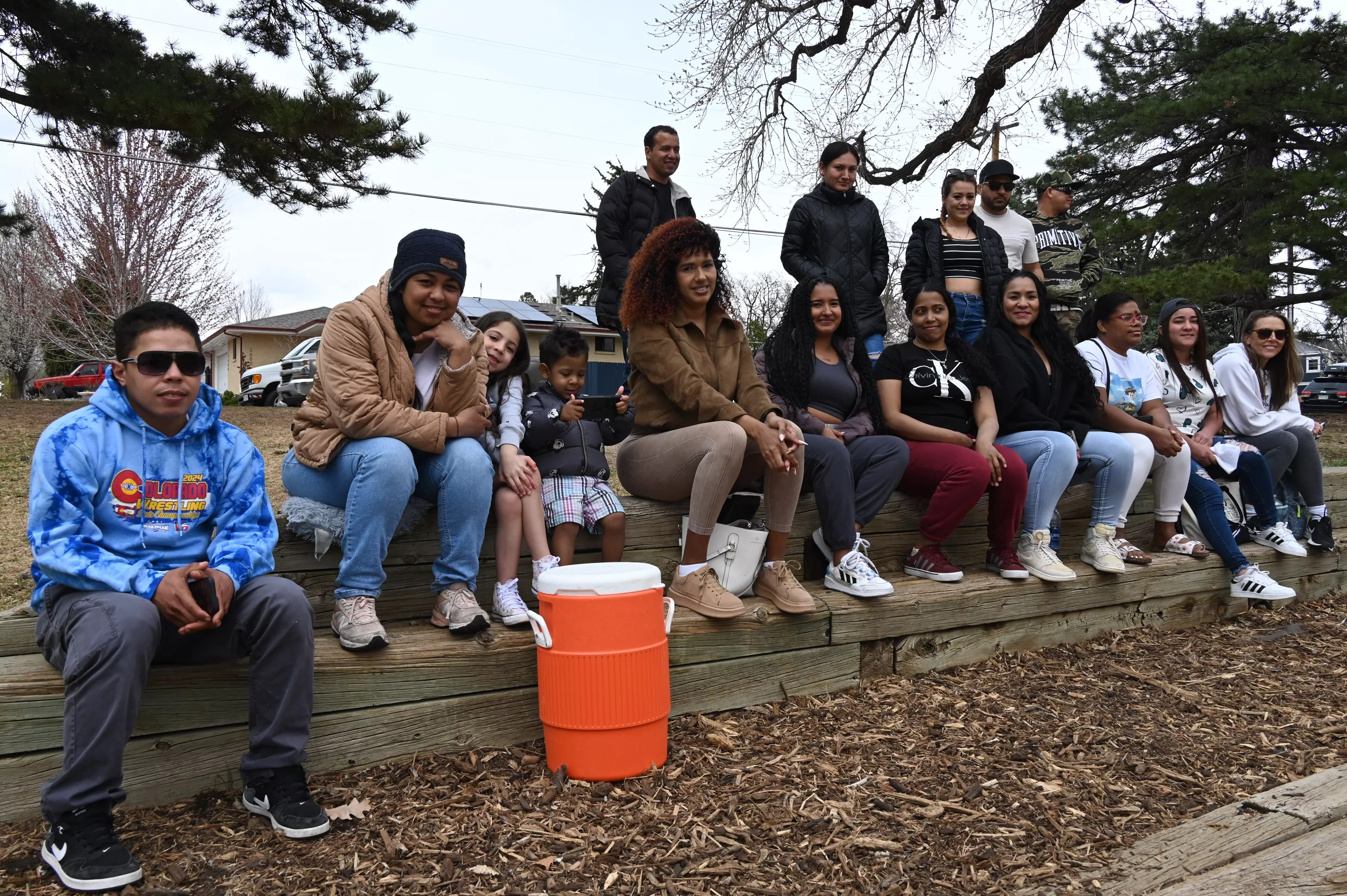
The parents of Team Venezuela drive or bus from Aurora to west Denver to take their kids to baseball practice.
Bennito L. Kelty
Team Venezuela only lost one game, Ramos says, and that record led the team to a Lil Bombers League Championship. It was special to win the championship “with kids who had gone through the same journey as me,” Ramos says.
Like Ramos, his players describe a traumatic journey from Venezuela. Velázquez says he remembers the “Rio Bravo, which is the border with Mexico and the United States, and a lot of people died,” he says. “The river would take them.”
Soto Montillo recalls that people died “in the jungle too,” referring to the Darien Gap. “In the jungle, there were dead people. There were two men lying down, holding hands, but they were already dead, and one was covered up.”
Velázquez adds: “And a dog too.”
Since arriving in the United States, people have been nice, the players say. According to Velázquez, the only exception was when “a person in Texas scared us and said a lot of bad words to us and that he wanted to hit us.”
But they wish they could forget what they saw on their journey.
“I’d like not to remember,” Soto Montillo says. “It feels like it’s happening again when I remember it.”
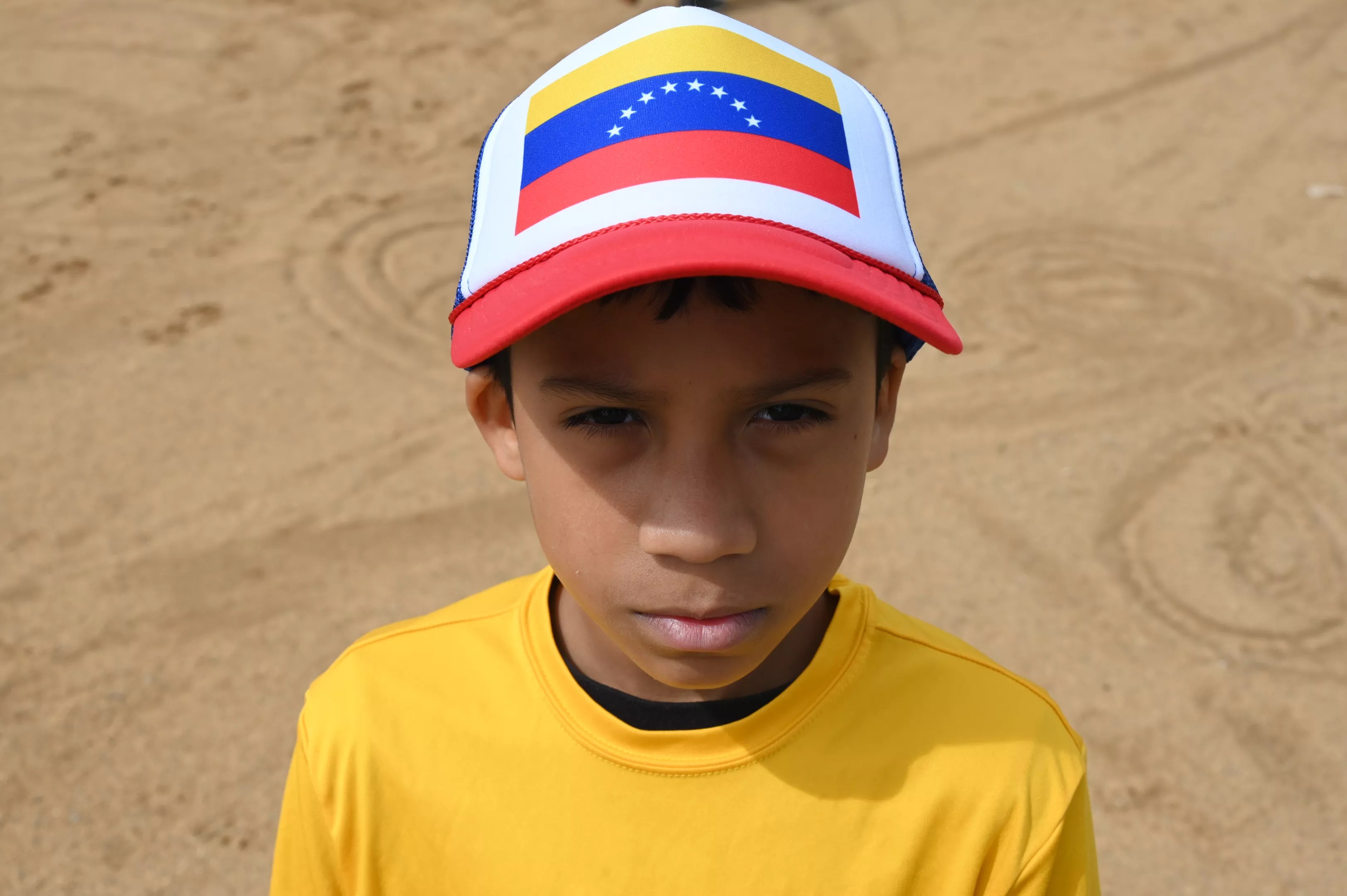
Angel Alejo wears the Team Venezuela caps and Altitude All Sports jersey that he got last year.
Bennito L. Kelty
It’s “very good, very good that they have can distract themselves” with the game, Ramos says of his players. Some kids like Soto Montillo and Velázquez are playing baseball for the first time since leaving Venezuela; others, like five-year-old Quevedo, are playing for the first time in their lives. But all of them “play Caribbean style, like we like to say,” Ramos says. “They play with lots of excitement and joy.
“It feels great more than anything because the kids feel happy on the field,” Ramos says. “They feel overwhelmingly happy and content.”
Looking for Diamonds
Every Tuesday, Thursday and Saturday, Ramos looks for baseball diamonds in west Denver that aren’t in use. Sometimes the diamond at Morse Park in Lakewood is open, and that’s not too far from his house. But most of the time, he comes to Sloan’s Lake and uses the small diamond in front of the lake, with the city skyline in the background.
Most of the migrant families live in Aurora, but they’ll take a bus or organize a carpool to drive across town and get to practice after Ramos sends a text telling them where it will be. Then the children practice until someone kicks them out, or they get tired or when the rain comes, though sometimes they’ll play through that.
The two high school students who helped sponsor Ramos last year still have their GoFundMe up, but they’re weren’t able to continue helping the team. But as helpful as donations would be, Ramos just wants more people to see his team play.
“The help that I’d like to see wouldn’t be financial so much as being present,” Ramos explains. “Visiting one of the games, one of the practices, and that way you can support us because there have been a lot of people that help us on social media.”
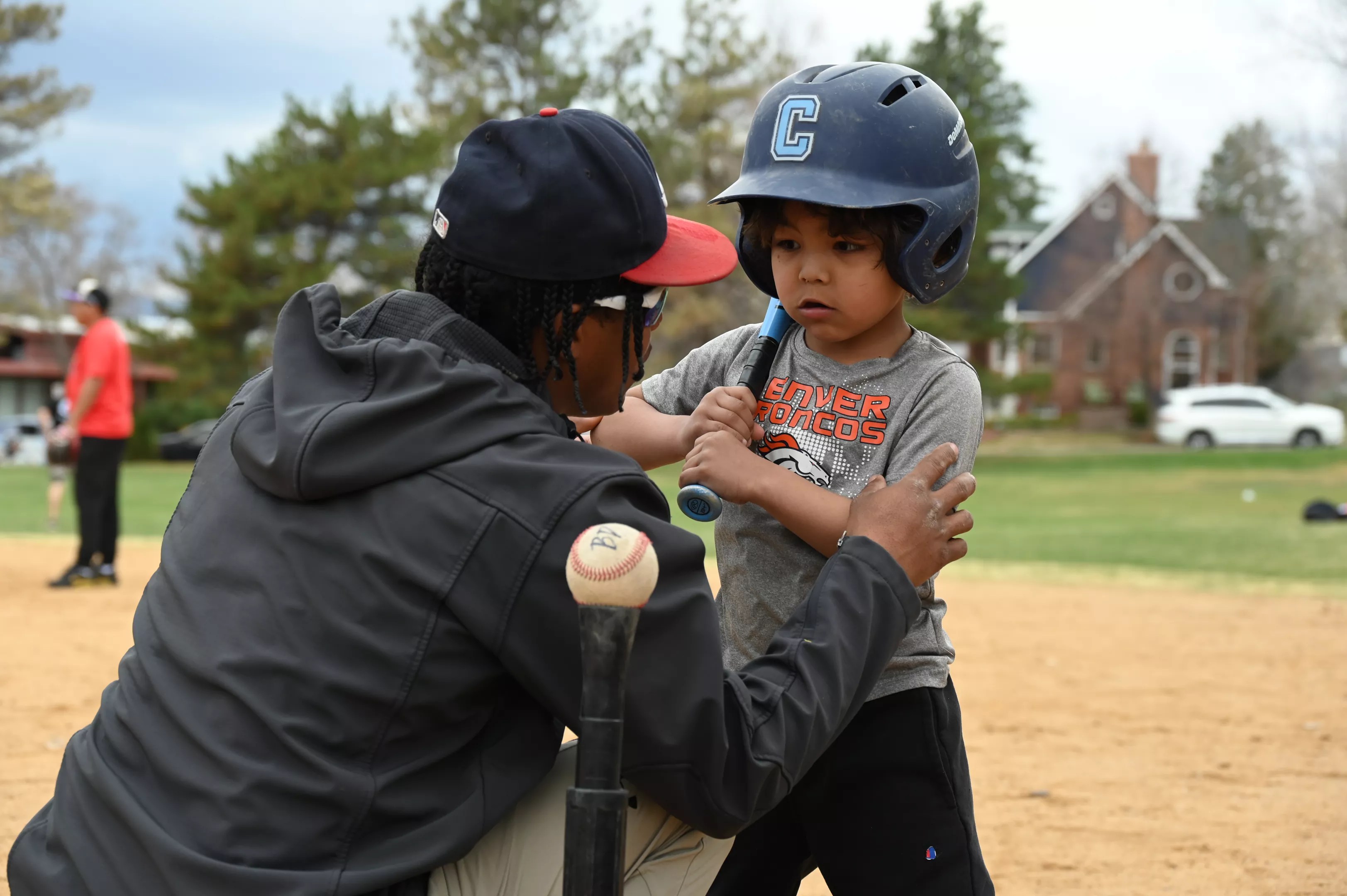
Julian Alexander Lara coaches five-year-old Malyob Quevedo.
Bennito L. Kelty
Ramos likes the exposure for his team because “it’s good that people see Venezuelans are up to something good.” In August, headlines started claiming that Aurora was taken over by the Venezuelan prison gang Tren de Aragua, and since then, “everybody has been categorizing us as members of Tren de Aragua,” he says.
“The majority of us are not those people,” he adds. “We left fleeing them, and we haven’t been able to here. Now, we’re nervous about them.”
Signing up with a league would help secure a field for practice, Ramos says, but he can’t find one and has been held back in the hunt by his limited English. Still, more parents keep signing their kids up for the Venezuelan Team; he charges $15 per kid, but that money goes to paying his coaches. Ramos manages the team for free, because he wants the players to have happy memories.
“It’s a memory I know that they’ll have for the rest of their lives,” Ramos says. “I know because I still remember the first practices and first teams that I played with.”
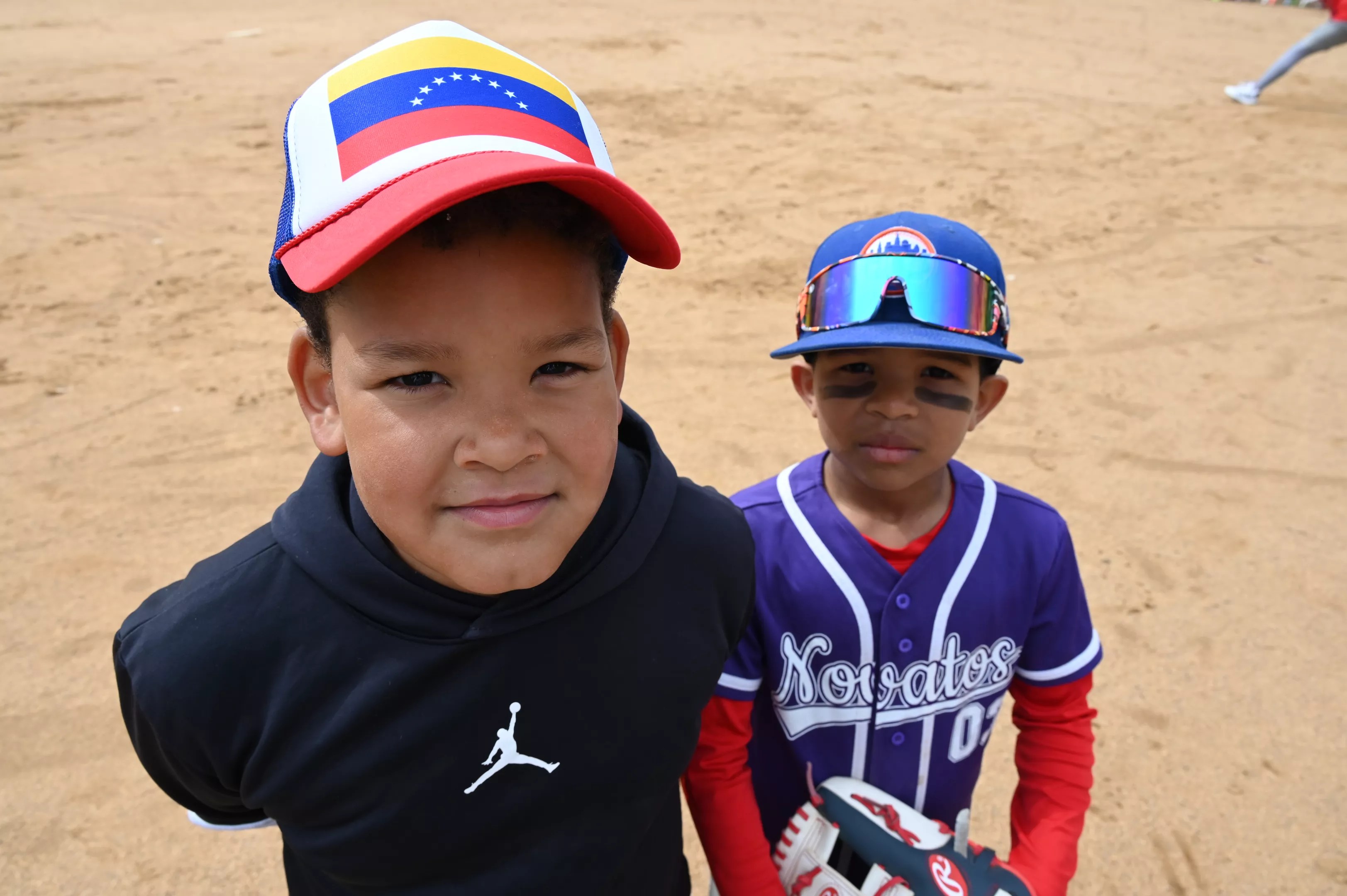
Derek Perez Leal and Isaias Lara want to be Major League Baseball players. Lara’s nickname is Luis Arraez, because he hits leadoff like the all-star MLB player.
Bennito L. Kelty